- Home
- Michelle Hodkin
The Reckoning of Noah Shaw Page 11
The Reckoning of Noah Shaw Read online
Page 11
Hinges creak behind us, and the door to the garden opens, revealing Goose, holding three sweating pints.
“Waited ages for the bartender,” he says, sounding mildly annoyed. “Ended up hopping the bar myself, thought I’d get some for all of us. Have some variety.” He sets the glasses down carefully on the unsteady table. Then, looking back and forth between us, he asks, “What did I miss?”
M offers a brief flicker of a smile. “I was about to pick up where we left off, as it happens.”
“Goody,” Goose says brightly.
M takes a small sip from one of the pints. “Not long after I was brought to London, to live with your family, I got married. He opposed it.” Then, to Goose, she explains, “The professor.”
“Right, I’ve heard of him,” Goose says, nodding.
“He was my tutor, then,” M says to me. “Your great-great-grandmother, Sarah, had said Simon arranged that, before he died.” A muscle tenses in M’s jaw. “He opposed the marriage. But Charles was sweet. Gentle. And my skin didn’t bother him.”
Goose, puzzled, asks, “Why would it?”
“Stop interrupting,” I say. I know where her story is headed, I think, and want to get there. Hear her tell it.
She brings her hand to her cheek. “Not a colour you’d have seen at society balls, at the time. Though some found me exotic,” she says with an edge. “But I had no parents, no family name of my own, no wealth of my own—still, Charles didn’t mind.” A smile begins at the corner of her lips, and then fades just as quickly. “The professor stopped coming to the house, once we were engaged. I saw him next six months later, on our wedding night, after I woke to find my new husband dead.”
Her hand reaches for her neck, her fingers spreading over her collarbone. “He was outside, standing there in the darkness, looking up at me in my dressing gown. He beckoned me outside and I went. I thought . . . I don’t know what I thought. That he would help me, I suppose. But he told me we had to leave—my new home, and London entirely.” Then, through gritted teeth, she says, “He knew my husband was dead without me saying it and he said—I’ll never forget what he said.” She closes her eyes. “ ‘The life you lived is no longer available to you. Everything you once had will vanish. You will be shunned, cast out.’ ”
And then M meets my eyes. “I was afraid to leave London. To leave your family. ‘They are not your family,’ was his reply. But he never told me who was.”
She swallows hard and says, her voice low as she recalls the professor’s words, “ ‘Your husband is dead because you killed him,’ he said. ‘You are not what Simon Shaw thought you were.’ I asked him what Simon had thought I was, then. ‘A cure,’ he said. And when I asked him what I was if not that, he replied, ‘A disease.’ ”
“Christ,” Goose says, almost under his breath.
A tiny, incredulous smile appears briefly on her mouth. “I asked him why he would say that, how he could say it, and he said he’d ‘seen’ it. In my future. Then he told me to obey him.
“I was scared, but angry as well. He’d vanished—left me without a word. He snapped at me, said I wasn’t his only student, he’d been assisting another at Cambridge but came, ‘as swiftly as he could.’ ” She glares at nothing, remembering. “Then he ordered me, ‘Take nothing from this house. Nothing from this life. We begin your real education at dawn.’ ”
M’s attention drifts back to us. She looks at me, but not my eyes. Her gaze is on my throat. “He gave me my pendant that night.”
22
THE ANCIENT TRAGEDY
I KNEW NOTHING THEN, ABOUT THE Afflictions. Though he called them Gifts, at the time,” she says to Goose. “Our lessons together had been about science and history and maths—he taught me everything I knew about the world. And then he showed me a new one, and told me my place in it,” she adds coldly. “We are what we believe we are, and he told me what to believe, what I was. He was my teacher, my father, and my lover, later. I trusted him implicitly. So when he assigned me my role, I performed it. Until I dared to imagine I could play a different part.”
Her words feel familiar, like echoes of my own thoughts.
Mara believed what she’d been told by the professor, after she got his letter. By my father, after he tortured us, tried to kill who we were.
“I have no right to want you,” she said to me.
“You have every right,” I insisted. “It’s your choice. It’s ours. We don’t have to be what they want. We can live the lives we want.”
And then I took off the pendant I’d worn since I’d found it, amongst my mother’s things. I hadn’t known until that day what it meant, what it would mean, me wearing it. Once I did, I took it off in front of her. Offered it to Mara in my open palm. Offered her my choice.
And I didn’t regret it, not once, until she’d taken away mine.
“I was taken as a child to a foreign country, knowing no one but your family and the professor,” M goes on. “Then my husband died in our bed and the professor appeared in the middle of the night, claiming I’d killed him and would suffer for it unless I went with him.” Her nostrils flare. “When we met I asked you to help me for Mara’s sake; I’d assumed she’d been manipulated, like I had been. But she had something I never had. She had you.”
M looks at me appraisingly. “You said she is where she is now because she chose to be, and I believe you, now. And respect you for respecting her choice. But I never had one. The professor never allowed me that.”
Her invoking our first meeting makes me think of something else. “You said my family owed you a debt,” I say slowly.
She nods, once. “The professor said that he’d met me in India, when I was younger, not in London as I’d first thought. He said he was paid by Simon Shaw to ‘unlock the secret to immortality.’ ”
My brow furrows. “How? How would Simon have known anything about you, all the way in India? How did he find the professor?” I ask her.
She smiles slightly, knowingly. “That’s what I’m hoping you’ll find out.”
“But how?” Goose asks, clearly baffled. “How, precisely, is Noah supposed to learn what you can’t?”
M looks at me, then at Goose.
“Genetic memory,” I say, feeling resigned.
“We’re connected to those who share our Gifts,” M says to Goose, repeating her words from our first meeting.
“All of us?” Goose asks.
She hesitates for a fraction of a second before nodding.
Goose’s expression is open, inquisitive. “How do we get that?” he asks. “The memory thing?”
She smiles carefully. “It starts with having an open mind.”
Goose sits a bit straighter. “I’ve got an open mind. Is that how we get our abilities back?”
M arches her brows.
“It was all of us who lost our superpowers, on the bridge,” says Goose.
“So I’ve heard,” she says.
How, though? Who would she have heard it from? “From whom?”
“There’s a whole world out there. More Gifted every day.”
“Yes, why is that, exactly?” Goose asks her, just as I say, “That’s not an answer.”
“Partly, your father is to blame.”
Kells’s voice worms its way into my consciousness, the words she spoke in those hallucinations—or memories.
David Shaw recruited me. Sponsored my doctoral research. Your father knows what you are. He knows what Mara is. His company’s been conducting research that probably spawned a clutch of Carriers all over the world.
“Kells wasn’t the only doctor working for my father.”
“Not as such, no.” Then, “I’m not convinced your abilities are really gone,” she says to Goose. “I think, instead, they might’ve been . . . cut off.”
“By what?” I ask.
“How?” Goose says at the same time.
She shrugs one shoulder. “I can’t say I know for certain. You might’ve done it yourselves—
our Gifts, they’re unlocked by consciousness. Will, and intent,” she says. “So whether it’s your abilities you’re interested in,” she says to Goose, “or whether you decide to help me find the freedom that’s been denied me,” she says to me, “you’d best begin by getting out of your own way.” She pours another glass of scotch, slowly. “Face what you’ve been hiding from.”
“I’m not hiding,” I say, chin lifted. “I’m avoiding.”
A withering look in response. “You walked into traffic to avoid me,” M says. “I won’t pretend to know you, but from what little I’ve seen? You run from pain, not toward it, like you think you do.”
I raise my mess of a fist as evidence to the contrary.
“Some might say a broken hand is preferable to a broken heart.” She looks at me with compassion, but without pity. “You’ve been through hell. Most of us have, but you had David as a father.” She tenses as she says his name. “And you lost Naomi so young. And you and Mara are twisted up in a net of the professor’s own design. It wouldn’t surprise me at all if you’ve locked away memories that might hurt you,” she says. “Somewhere in your mind is the key.” She nudges the glass, her own glass, toward me. “You have to want to find it, though.”
“How?” Goose asks.
I shoot him a glare.
“As I’ve said from the beginning, I would start by going home,” M says. “By which I mean the manor.” She reaches down for her bag. “That’s where your family’s story begins.” She stands, shouldering her tote. “And then you might consider visiting Cambridge? You’ve got loads of family history there as well.”
“All right,” I say finally. I’m sufficiently intrigued, now, despite myself. And if I say no, she’ll probably never stop haunting me. “On one condition, though.”
“Yes?”
“Leave Kate out of it,” I say, remembering what my sister said, thinking of her and M together, today. “All of it. Don’t contact her again.”
M doesn’t hesitate before answering, “Done.” Then she withdraws an envelope from her handbag. Slides it across the table.
“You don’t have to pay me,” I say, slightly horrified.
“It isn’t money.”
“Dare I ask?”
The corner of her mouth turns up. “It helped me open my mind, once, when I found myself . . . blocked. It’s a bit out of fashion, now, perhaps. But rather popular in the seventies.” She shrugs again. “Not a bad decade, all things considered.”
She can’t mean—
“Stay at the manor tonight,” she says. “Rattle some cages. See if anything bites.” She turns to leave.
“And where will you be?” Goose asks her turned back.
She looks over her shoulder. “Waiting,” she says, and leaves.
Goose picks up the envelope. Hands it to me. “What do you think . . . ?”
I shrug, then slide my finger under the flap, expecting a letter, perhaps, or maybe a map—
“What is it?”
I slide the small sheets of blotting paper out, just far enough so Goose can see. Each tab of—is it acid?—is stamped with the letter M.
“Oh shit.”
23
MORE AND MORE VISIBLE
IT’S MY SISTER WHO GETS us back inside.
We shamble back up to the manor just as Kate is driving past the line of yew trees that leads back to the house.
“Kate!” I shout. She passes us, but only slightly, and lets the car idle. I knock on her window.
“Thank God. I need your help.”
My sister’s blue eyes narrow.
“I’ve been shit,” I say, a bit desperately. “I’m sorry. I know I can’t make it up to you, but I want things to be different.”
“What do you want?”
“I need to get back in,” I say, tipping my head at the house.
“It’s your house.”
“They don’t believe me. I’ve lost my ID.” Should’ve settled it all with Mrs. Balfour, but ended up with other shite on my mind.
“You’re pathetic,” she says.
“I am, truly.”
“How’d you get in before?”
“With the tourists. Had to pay.”
She smirks at that. “All right. Get in.”
I wave Goose over.
Kate pushes up her sunglasses, drives up to the gate, and smiles at the guard. “Roger, this is my brother, Noah. He’s lost his ID, like an idiot.”
“Hi,” I say. “Lovely to meet you.”
“Can you let the rest of security know he’s here?” Kate asks.
“Of course, miss.”
“Thanks ever so,” I say, as Kate rolls the window back up and drives toward the garage. “You don’t have to come back in—”
“I do, actually. You’ll need to meet Mrs. McAdams, and Victor—”
“Is Albert not here anymore?” The family valet proved indispensable, in Miami, when things got . . . complicated . . . in the past.
“He’s on vac,” Kate says, pulling into the garage.
“Shame.”
Kate walks through the wings with a self-possession I envy. She looks like she belongs here. Which she does.
Once we’ve made the rounds, she says, “Hold out your hand.”
I raise my eyebrows, but obey. She drops a key in my open palm.
“It’s to the residence. The staff leaves at seven today.”
“Thank you,” I say sincerely.
She doesn’t acknowledge it. “Farewell, again, Goose.”
“Where are you going?” I ask her. M’s promise aside, I can’t help but wonder.
“Bath,” she says. “To meet Grandmother and Grandfather.”
“That’s hours away.”
“I’m staying the weekend. She wants me to start back at Cheltenham, and wanted to spend time with me before I’ve got to get settled in for class.”
“But I only just got here.”
Despite our earlier exchanges, the corner of her mouth twitches into the beginnings of a smile. “You’ll manage. Mind the ghosts, though.” To my surprise, she kisses me on both cheeks before saying goodbye.
“Well,” Goose says. “I’m sure that’s fine.”
“Which part?” I ask. “Kate?”
Goose glares at me.
“You don’t mean—you don’t believe in ghosts,” I say.
“I absolutely do.”
I lean back on my heels. “How did I not know this about you?”
“Your unrelenting self-obsession, perhaps?”
“Perhaps,” I say. “So.” I pat my pocket, where the envelope rests. “What is the plan?”
He squints at the sunset through the tracery on the windows. “Well, it’s too early for acid.”
“I’m sure that’s not a thing. Though perhaps we should wait till the tourists leave.”
“So we don’t end up playing strip cricket in the gardens?”
I hold up a single finger. “One time.”
“One memorable time,” he says. “What do you think Patrick and Neirin are doing just now?”
“I don’t know.” I run my hands through my hair. “Once you’re wrapped up in all this, the rest of the world sort of drops off.”
“It is rather a lot, isn’t it?”
“Which part, my ex-girlfriend’s hundred-and-fifty-year-old grandmother encouraging us to do hallucinogenics or . . .”
“That part, yes. And the part before that, about us being a different species.”
“Bit of an exaggeration.”
“Is it?”
“Fair.” I look up and around. “Where should we go?”
“Kitchen,” Goose says. “Always.”
We startle the housekeeper upon finding it. “Goodness, you scared me half to death.”
“Terribly sorry,” I say. “Mrs. McAdams, is it?”
“Yes, sir.”
“Oh, Noah, please, I insist.”
She smiles. “I was just about to lock up—the cook’s already left for
the weekend, but I’m sure we can rustle something up for you.”
“Oh, no need, we’ll be fine,” I say.
“We’re very resourceful,” Goose adds.
She looks doubtful. “I’m afraid we didn’t know to expect you, so there isn’t anything prepared.”
“Truly, we’ll be quite all right.”
“I love to cook,” Goose says.
“Really?” Mrs. McAdams looks doubtful, but says, “Lovely. Well, then,” she adds, hands on her hips. “I’ll leave you to it! Choose any bedchamber you like, someone will be in in the morning to pick up after you.”
“Yes, ma’am.”
“Enjoy your evening, lads.”
“Oh, we will.” I smile charmingly.
“Mrs. McAdams,” Goose calls after her. “So sorry, one question.”
“Yes, dear?”
“I heard something on the way in about ghosts?”
“Ah, is that what you’re after?”
“No,” he says, just as I say, “Yes,” to annoy him.
Her blue eyes widen with mischief. “Which one were you hoping to spot? The Grey Lady, perhaps? Or the boy?”
“Neither,” Goose says, just as I say, “Both.”
“Well, I’ve never seen them myself, but supposedly this is a good spot for it, if you go in for that sort of thing.” She gives a little shake of her head, her short red curls bouncing. “There’s a book in the gift shop, published by the Trust. Features all the great haunted houses in Britain. There’s an entry on this one, as it happens. Shop’ll be closing up now, but there might be a copy in the lord’s library, I believe.”
“Thanks,” we say in unison.
Goose opens the fridge once she leaves. “Hmm,” he says disapprovingly. “I’m going to need to fetch that book before it gets dark.”
“Why?”
“Want to know which rooms to avoid.”
“You really are mental.”
“Pot, kettle.”
It’s dark by the time we finish our makeshift supper (tea, sandwiches), and a brief search of my grandfather’s study yields no paranormal publications, so Goose decides we should burgle the gift shop.
“It’s locked, she said.”
“Nothing’s ever really locked.”
A memory clicks into place, from my other life, again; Jamie breaking into Dr. Kells’s office, saying something similar. “You and Jamie really would be quite the match.”

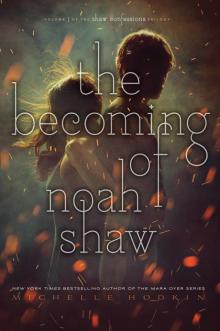 The Becoming of Noah Shaw
The Becoming of Noah Shaw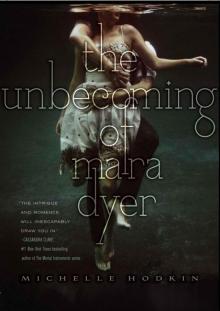 The Unbecoming of Mara Dyer
The Unbecoming of Mara Dyer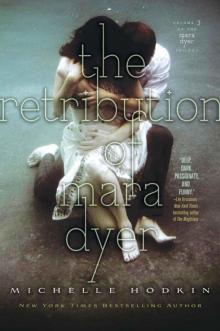 The Retribution of Mara Dyer
The Retribution of Mara Dyer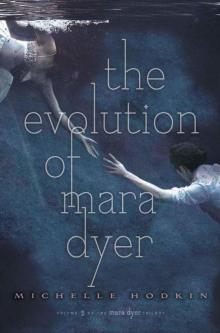 The Evolution of Mara Dyer
The Evolution of Mara Dyer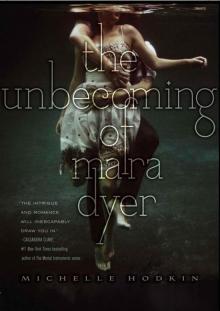 The Unbecoming of Mara Dyer md-1
The Unbecoming of Mara Dyer md-1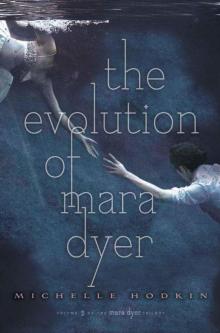 The Evolution of Mara Dyer md-2
The Evolution of Mara Dyer md-2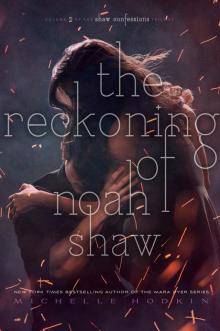 The Reckoning of Noah Shaw
The Reckoning of Noah Shaw